Views expressed in opinion columns are the author’s own.
Last week, the University of Maryland’s journalism college invited public relations crisis expert Michael Sitrick to speak on campus. Sitrick, a self-described “fixer” has represented many controversial celebrities and public figures, such as Harvey Weinstein, Chris Brown and Michael Vick. His job is essentially to help these people look good and maintain their reputation after they are — often rightfully — accused of doing bad or criminal things.
While I understand the allure of learning from a person who improves the reputations of even the worst people, sponsoring an event with Sitrick was a bad move on this university’s part. Sitrick’s firm and business decisions are plainly immoral — he has no problem trying to make awful people look better. As an institution of higher education, this university is responsible for shaping the minds of young people and should be actively instilling in them a sense of morality.
The fact that Sitrick represented Weinstein is especially important in considering whether it was appropriate for this university to host him. Both The New York Times and The New Yorker won Pulitzer Prizes for their coverage of the scandal. It’s ironic and unfortunate that a journalism college would host Sitrick, who worked so hard to ensure that Weinstein wouldn’t face consequences, when transparency and reporting the truth are two of the most important principles of journalism.
Sitrick dropped Weinstein as a client in April of this year, and, although he has refused to say why, he swore that it was not out of concern for his firm’s reputation. Because of this, it’s safe to assume assume that Sitrick took no issue with trying to create good publicity for a man who was accused of sexual assault and harassment by dozens of women.
Sitrick also insists that, in the era of #MeToo, if you’ve been accused of sexual assault or harassment, “you’re guilty until proven innocent.” But, sexual assault victims are truly the ones who are guilty until proven innocent. We give men, particularly powerful men, the benefit of the doubt, while the victims, typically women, are treated like the guilty ones.
When we say their outfit caused the assault or that they had an ulterior motive for accusing their attacker, the victims then also become guilty until proven innocent. The burden of proof should fall on the accuser, but that doesn’t mean we have should criminalize them until the attacker is found guilty. Sitrick’s work, given that he’s represented some of the worst celebrities in the country, perpetuates this culture, and by hosting him, so does this university.
Unfortunately, it’s not surprising that Sitrick was given a platform here, nor is it shocking that university President Wallace Loh himself showed up to the event. Following the death of Jordan McNair and the subsequent fallout from an ESPN article detailing the “toxic culture” of its football program, this university has frequently attempted to deny responsibility and cover up bad publicity. Hosting Sitrick represents how this university constantly hurts its students and then tries to cover up its mistakes.
In the name of free speech, Sitrick should be allowed to speak on campus if a student organization wants him to. But for this to be a university-sponsored event brings up the question of why the university decided to invite such a reprehensible person. Do we expect this school to uphold any kind of moral code? Perhaps that depends on whether this university thinks ethics should come before profit, and I don’t have the answer to that.
Liyanga de Silva is a junior English major. She can be reached at liyanga.a.ds@gmail.com.



